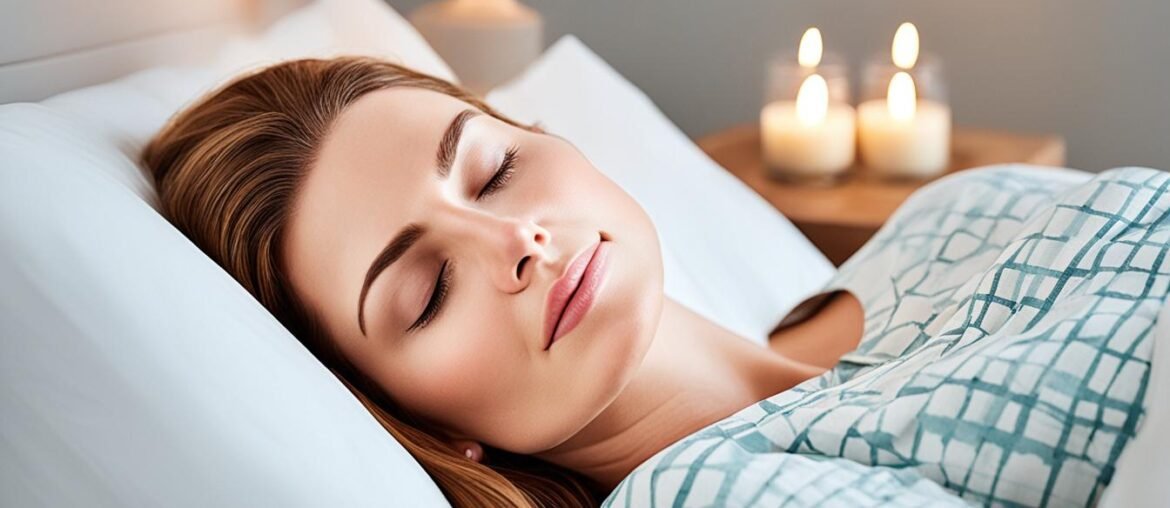Did you know that the average person spends about a third of their life sleeping? While sleep is essential for overall well-being, it also plays a crucial role in maintaining skin health and appearance. Quality sleep is not just for feeling refreshed; it directly impacts your skin’s health, radiance, and youthfulness. In this article, we will explore the connection between sleep and skin rejuvenation, the effects of poor sleep on skin health, and practical tips for maximizing sleep’s benefits for your skin.
Key Takeaways:
- Sleep is vital for maintaining skin health, radiance, and youthfulness.
- Poor sleep quality or sleep deprivation can lead to various skin issues and accelerated signs of aging.
- Sleep plays a crucial role in skin rejuvenation, aiding in the repair and rebuilding of collagen and damaged skin cells.
- Practicing good sleep hygiene and prioritizing adequate sleep can help maximize the benefits of sleep for your skin.
- A regular sleep schedule and optimal sleeping positions can contribute to a clear complexion and overall skin health.
The Effects of Poor Sleep on Skin Health
Research has shown that chronic poor sleep quality can have detrimental effects on skin health. When we don’t get enough quality sleep, it can lead to various issues that negatively impact the appearance and overall health of our skin.
Signs of Aging Due to Poor Sleep
Poor sleep quality is often associated with an increased risk of accelerated signs of aging. Studies have found that individuals with poor sleep tend to have higher scores of intrinsic skin aging, which refers to the visible signs of aging that occur naturally over time, such as wrinkles, fine lines, and sagging skin.
Furthermore, lack of sleep can impair the skin’s ability to repair and regenerate, leading to a slower turnover of skin cells and a duller complexion. This can make the signs of aging more prominent and make the skin appear tired and aged.
Impaired Skin Barrier Function from Lack of Sleep
Another effect of poor sleep on skin health is the impairment of the skin’s barrier function. The skin’s barrier is responsible for protecting against external irritants and preventing excessive water loss.
However, when we don’t get enough quality sleep, the skin’s barrier can become compromised. Research has shown that sleep deprivation can disrupt the natural skin barrier, leading to increased transepidermal water loss (TEWL) and reduced skin hydration. This can result in dry, flaky skin and a weakened ability to protect against environmental stressors.
Poor Sleep and Dissatisfaction with Appearance
Additionally, poor sleep can significantly impact our satisfaction with our appearance. When we’re sleep-deprived, the skin can appear dull, lackluster, and less vibrant. Dark circles, puffiness, and a sallow complexion are common visible signs of poor sleep.
This can lead to dissatisfaction with our appearance, affecting our self-esteem and confidence. When we don’t feel good about how our skin looks, it can have an emotional toll on our overall well-being.
Given the wide range of negative effects poor sleep can have on skin health, it’s essential to prioritize getting enough quality sleep each night. By establishing a consistent sleep routine and practicing good sleep hygiene, we can support our skin’s natural rejuvenation process and maintain a healthy, youthful complexion.
The Connection Between Sleep and Skin Rejuvenation

Sleep plays a crucial role in the rejuvenation of our skin. It is during sleep that the body undergoes essential processes to repair and restore itself, including the rebuilding of collagen in the skin. Collagen is a vital protein that gives our skin its elasticity and flexibility, and its production during sleep helps reduce the appearance of wrinkles and fine lines.
During sleep, the body also produces growth hormones that aid in muscle growth and cell repair. These growth hormones are responsible for the rebuilding and regeneration of collagen, contributing to the overall rejuvenation of the skin. By getting enough sleep, we support the natural production of collagen, helping to maintain a youthful and radiant complexion.
Moreover, sleep allows for the repair of damaged skin cells. Throughout the day, our skin is exposed to various environmental stressors, such as UV radiation and pollution, which can damage our skin cells. During sleep, our body focuses on repairing and renewing these damaged cells, contributing to the overall health and appearance of our skin.
Not only does sleep aid in skin rejuvenation, but it also plays a role in the formation of new pathways in the brain related to learning and memory. This ensures our brain’s optimal function, allowing us to perform at our best during the day and maintain overall well-being.
“Sleep is not just a time for our bodies to rest, but also a critical period for our skin to repair and rejuvenate.”
The Impact of Sleep on Collagen Production
Sleep directly influences collagen production in the skin. Collagen is responsible for maintaining the skin’s structure and firmness, making it an essential component for healthy and youthful-looking skin. Lack of quality sleep can disrupt the production of collagen, leading to a loss of skin elasticity and the appearance of wrinkles and sagging.
By prioritizing sufficient sleep, individuals can support the natural production of collagen, helping to maintain a resilient and plump skin texture.
The Skin Repair Process During Sleep
During sleep, the skin undergoes a repair process known as skin rejuvenation. This process includes the synthesis of new collagen fibers, the regeneration of skin cells, and the healing of any damage sustained throughout the day. This repair process is vital for maintaining skin health and enhancing its overall appearance.
Furthermore, sleep stimulates increased blood flow to the skin, delivering essential nutrients and oxygen while removing waste products. This promotes a healthy skin complexion and supports the skin’s natural ability to heal and repair itself.
Sleep is not only essential for our physical and mental well-being but also for maintaining healthy and rejuvenated skin. It is during sleep that our body focuses on repairing and renewing our skin cells, producing collagen, and promoting overall skin rejuvenation. By prioritizing quality sleep, we can support our skin’s health and achieve a vibrant and youthful complexion.
The Impact of Sleep on Skin Aging
Adequate sleep plays a vital role in maintaining youthful skin and preventing premature aging. The quality and duration of your sleep can significantly impact the appearance of your skin, including the development of wrinkles, crow’s feet, and frown lines.
Research has shown that sleep deprivation, even just one night of inadequate sleep, can have noticeable effects on the skin. It can lead to paler skin tone, swollen eyes, and the dreaded dark circles under the eyes.
By prioritizing good sleep habits and ensuring you get enough quality sleep, you can slow down the aging process and maintain a more youthful complexion.
The Effects of Sleep Deprivation on Skin Aging
Sleep deprivation has been linked to accelerated skin aging. When you don’t get enough sleep, it disrupts the natural restorative processes that occur during sleep, such as collagen production and cellular repair.
Collagen is a protein that gives the skin its elasticity and firmness. During sleep, the body produces more collagen, helping to reduce the appearance of wrinkles and maintain skin elasticity. When you lack sleep, collagen production decreases, leading to the formation of visible signs of aging on the skin.
In addition to collagen depletion, sleep deprivation can also lead to increased levels of cortisol, a stress hormone. Elevated cortisol levels can break down collagen and compromise the skin’s barrier function, making it more susceptible to environmental damage.
Furthermore, inadequate sleep can impair the skin’s ability to retain moisture, resulting in dryness, flakiness, and an overall lackluster complexion. Skin dehydration can accentuate the appearance of fine lines and contribute to premature aging.
Preventing Premature Aging Through Quality Sleep
Sleep plays a crucial role in preventing premature aging and maintaining the overall health of your skin. Here are some tips to help you prioritize sleep for optimal skin health:
- Establish a consistent sleep schedule and aim for 7-9 hours of quality sleep per night.
- Create a sleep-friendly environment by keeping your bedroom cool, dark, and quiet.
- Avoid caffeine and heavy meals close to bedtime, as they can disrupt your sleep.
- Practice relaxation techniques, such as deep breathing or meditation, before bed to promote better sleep.
- Invest in a comfortable mattress and pillow to improve sleep quality and reduce the risk of developing sleep wrinkles.
Prioritizing good sleep habits and ensuring you get enough restful sleep is essential for maintaining the health and youthful appearance of your skin. By taking care of your sleep, you can ensure that your skin ages gracefully and radiates a natural glow.
The Relationship Between Sleep and Skin Appearance
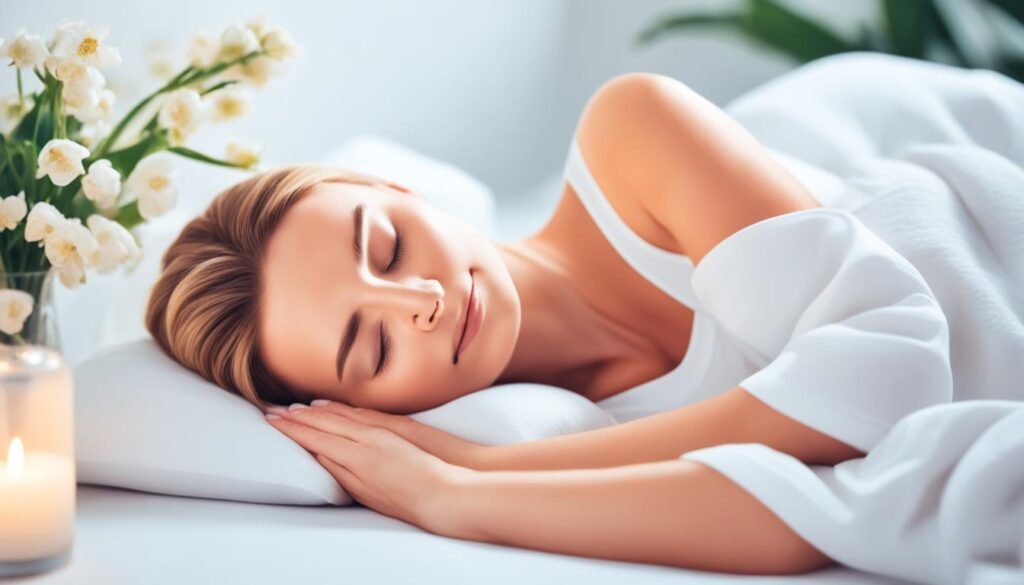
Sleep plays a vital role in the appearance of our skin. It has a profound impact on skin complexion, hydration, and overall health. When we maintain a regular sleep schedule, our body’s internal clock regulates skin behavior, resulting in a more balanced and radiant appearance.
During sleep, the skin experiences increased blood flow, allowing essential nutrients and oxygen to reach the surface. This improved circulation contributes to a healthier complexion, as well as better skin hydration. Adequate sleep promotes optimal water balance within the skin cells, preventing dryness and promoting a supple, youthful glow.
Conversely, a lack of sufficient sleep or late bedtimes can disrupt the skin’s natural moisture balance. Dehydrated skin can lead to issues such as flaking, peeling, and an increase in oily secretions. Excess oil can clog pores and contribute to acne breakouts, further compromising skin appearance and health.
By prioritizing quality sleep and maintaining a consistent sleep schedule, we can positively impact our skin’s appearance. It is essential to give our skin the opportunity to rejuvenate and repair itself through adequate rest. Investing in sufficient sleep can result in a beautifully glowing complexion and improved overall skin health.
Key Takeaways:
- Sleep directly affects skin appearance and complexion.
- During sleep, increased blood flow improves skin hydration and overall complexion.
- Lack of sleep or irregular sleep patterns can lead to dehydrated skin and an increase in oily secretions.
- Prioritizing quality sleep promotes a balanced and radiant complexion.
Maximizing sleep’s benefits for skin involves maintaining a regular sleep schedule, ensuring optimal hydration, and avoiding disruptive sleep habits. By incorporating these practices into our daily routine, we can enhance our skin’s appearance and achieve a healthier, more youthful glow.
The Effects of Sleep Deprivation on Skin Health
Sleep deprivation can have a significant impact on skin health, leading to various skin issues and concerns. When individuals consistently get less sleep than recommended, it can take a toll on their skin’s appearance and overall well-being.
One of the most common skin issues associated with sleep deprivation is the appearance of dark circles under the eyes. Lack of sufficient restorative sleep can cause fluid to accumulate in the delicate under-eye area, resulting in puffiness and darkness.
Additionally, sleep deprivation can lead to paler skin tone. This occurs because inadequate sleep affects blood circulation, resulting in reduced oxygen flow to the skin. As a result, the skin may look dull, sallow, and lacking vitality.
Furthermore, sleep deprivation can contribute to the development of wrinkles and fine lines. During sleep, the body repairs and regenerates skin cells, including the production of collagen, which is responsible for maintaining skin’s elasticity and firmness. Without enough sleep, this natural repair process is hindered, leading to the premature formation of wrinkles and the loss of skin’s youthful appearance.
Dryness and dehydration of the skin are also common effects of sleep deprivation. Sleep plays a vital role in regulating the body’s hydration levels, and without sufficient rest, the skin’s moisture barrier can become compromised. This can result in dry, flaky, and irritated skin.
It is evident that sleep deprivation has a profound impact on skin health. To maintain optimal skin condition, it is crucial to prioritize adequate sleep and establish healthy sleeping habits.
Sleep deprivation affects various aspects of skin health, including the appearance of dark circles, paleness, wrinkles, and dryness. Prioritizing sleep is essential for maintaining a healthy and vibrant complexion.
| Skin Issues Due to Sleep Deprivation | Description |
|---|---|
| Dark Circles | Visible discoloration and puffiness under the eyes caused by lack of restorative sleep. |
| Paler Skin Tone | Dull, sallow complexion due to reduced blood circulation and oxygen flow. |
| Wrinkles and Fine Lines | Premature formation of wrinkles and loss of skin’s elasticity from disrupted collagen production. |
| Dryness and Dehydration | Impaired skin moisture barrier leading to dry, flaky, and irritated skin. |
To maintain optimal skin health, it is crucial to prioritize quality sleep by establishing a consistent sleep routine, creating a sleep-friendly environment, and practicing good sleep hygiene. By doing so, one can minimize the negative effects of sleep deprivation on skin and promote a radiant and healthy complexion.
Tips for Maximizing Sleep’s Benefits for Skin
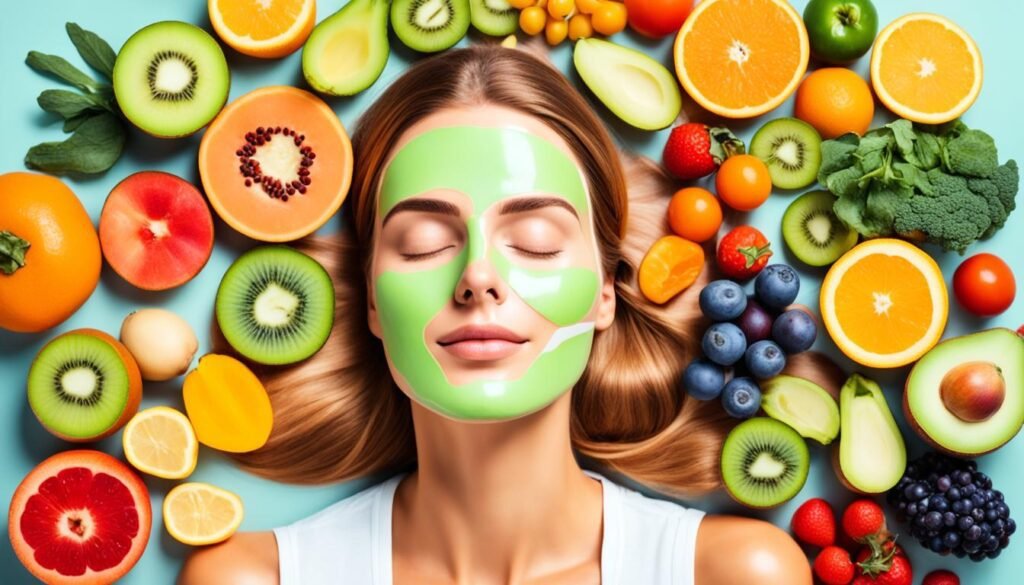
Practicing good sleep hygiene is essential for maximizing the benefits of sleep on skin health. Here are some valuable tips to help you improve your sleep routine and enhance your skin’s overall well-being:
1. Establish a Regular Sleep Schedule
Try to go to bed and wake up at the same time every day, including weekends. This consistency helps regulate your body’s internal clock and promotes better sleep quality, leading to healthier skin.
2. Create a Quality Sleep Environment
Make your bedroom a sleep-friendly space by minimizing noise and darkness. Use curtains or blinds to block out external light, and consider using earplugs or a white noise machine to reduce disturbances. A peaceful sleep environment enhances your body’s ability to repair and regenerate the skin.
3. Engage in Calming Activities Before Sleep
Unwind before bed with relaxing activities such as reading a book, practicing gentle yoga or meditation, or taking a warm bath. These activities help calm your mind and prepare your body for a deep and restful sleep, promoting skin rejuvenation.
4. Exercise Regularly, But Avoid Vigorous Activity Close to Bedtime
Regular exercise is beneficial for overall health, including sleep quality. Engage in moderate-intensity exercise earlier in the day, as exercising close to bedtime may stimulate your body and make it harder to fall asleep. Remember, a well-rested body leads to better skin health.
5. Use a Skin-Friendly Pillowcase
Consider using a satin or silk pillowcase that is gentle on the skin. These materials reduce friction between your face and the pillow, minimizing the risk of developing sleep creases and preventing potential damage to your skin’s delicate surface.
6. Optimal Sleeping Position for Skin Health
Sleeping on your back is generally considered the best position for minimizing the formation of wrinkles and maintaining skin health. This position helps prevent compression of the face against the pillow, reducing the risk of developing sleep lines and allowing your skin to breathe freely throughout the night.
7. Protect Your Skin from Direct Sun Exposure While Sleeping
When sleeping near windows or in direct sunlight, ensure your skin is protected. Close curtains or blinds to minimize exposure to harmful UV rays, which can contribute to skin damage and premature aging.
By incorporating these tips into your sleep routine, you can maximize the benefits of sleep for your skin’s health and achieve a radiant and rejuvenated complexion.
| Sleep Hygiene Tips for Better Skin Health: |
|---|
| Establish a regular sleep schedule |
| Create a quality sleep environment |
| Engage in calming activities before sleep |
| Exercise regularly, but avoid vigorous activity close to bedtime |
| Use a skin-friendly pillowcase |
| Optimal sleeping position for skin health |
| Protect your skin from direct sun exposure while sleeping |
The Science Behind “Beauty Sleep”
The concept of “beauty sleep” has some scientific basis. Sleep plays a significant role in maintaining and repairing the entire body, including the skin. During sleep, various restorative processes occur, such as increased growth hormone production and skin cell repair. These processes influence physical appearance and can impact an individual’s self-perception of beauty. However, beauty standards vary, and additional research is needed to fully understand the connection between sleep and physical attractiveness.
How Sleep Deprivation Can Affect Appearance
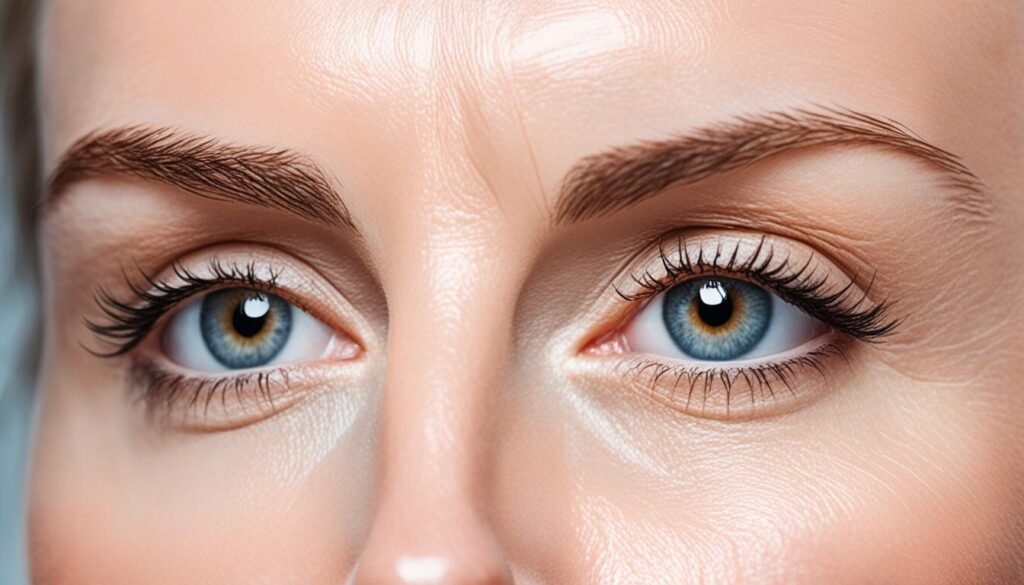
Sleep deprivation can have noticeable effects on appearance. When we don’t get enough sleep, it can manifest in various physical signs and impact how we are perceived by others.
Physical Signs of Sleep Deprivation
One of the most visible physical signs of sleep deprivation is swollen eyes. Lack of sleep can cause fluid retention around the eyes, leading to puffiness and a tired appearance.
Another common sign is the development of dark under-eye circles. Sleep deprivation can cause blood vessels under the eyes to dilate and become more prominent, resulting in dark discoloration.
Sleep-deprived individuals often experience paler skin as well. Reduced blood flow and oxygenation during sleep deprivation can lead to a dull complexion and lackluster skin tone.
“Sleep deprivation affects not just how we feel, but how we look. It’s like wearing exhaustion on our face.”
Social Implications of Sleep-Deprived Appearance
The way we look plays a significant role in our social interactions and judgments. Sleep-deprived individuals may appear sadder and more fatigued, which can influence how others perceive their mood and overall well-being.
People often make assumptions about an individual’s character based on their appearance. Sleep deprivation can create a negative impression, making others believe that someone is less alert, less capable, or lacking in self-care.
The Impact on Hair Health
Sleep deprivation can also affect the health of our hair. Lack of sleep disrupts the body’s hormone balance, leading to excessive oil production in the scalp. This can result in greasy hair and an oily scalp, which can add to the overall tired and unkempt appearance.
In some cases, sleep deprivation can even contribute to hair loss. Research suggests that chronic sleep loss may disrupt the hair growth cycle and contribute to premature hair thinning and shedding.
It’s important to prioritize quality sleep to maintain a healthy and vibrant appearance.
| Effects of Sleep Deprivation on Appearance | Physical Signs | Social Implications |
|---|---|---|
| Swollen eyes | Dark under-eye circles | Negative perceptions of mood and well-being |
| Paler skin | Greasy hair and scalp | Assumptions about character and capability |
| Hair loss |
The Role of Sleep in Maintaining Clear Skin
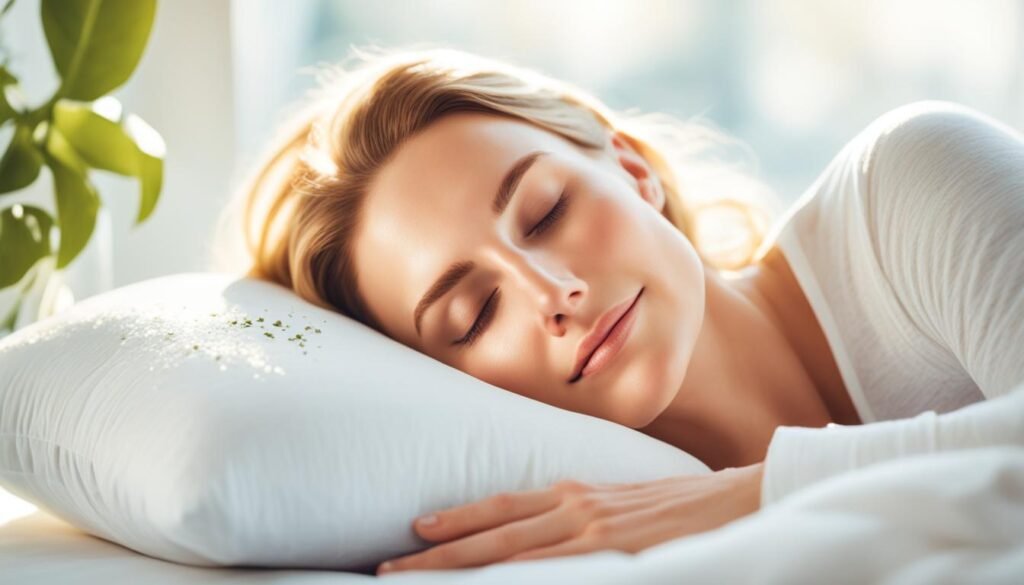
Adequate sleep plays a vital role in maintaining a clear and healthy complexion. While we sleep, our skin undergoes essential repair and restoration processes, including the healing of damaged skin cells caused by UV sunlight exposure. Additionally, sleep boosts the skin’s blood flow, which helps increase body temperature and facilitates the repair of severely damaged skin.
Lack of sleep or poor sleep quality can have negative effects on the skin’s appearance and overall complexion. When we don’t get enough sleep, our skin may start to peel, become dehydrated, and experience changes such as increased water loss and oily secretions, which can lead to acne formation.
To prioritize clear skin, it is important to establish healthy sleep habits and ensure a good night’s rest. This includes maintaining a consistent sleep schedule, creating a soothing sleep environment, and practicing proper sleep hygiene. Prioritizing quality sleep will not only benefit your skin but also contribute to your overall well-being.
“A good night’s sleep is essential for maintaining a clear and radiant complexion. During sleep, the skin repairs and rejuvenates, enhancing its overall appearance and promoting a healthy glow.” – Dr. Emily Johnson, Dermatologist
Conclusion
Sleep plays a critical role in maintaining the health and appearance of our skin. It is vital for achieving a radiant complexion, promoting skin rejuvenation, and slowing down the aging process. High-quality sleep allows for the repair and rebuilding of collagen, which reduces signs of aging and improves skin barrier function. Additionally, adequate sleep contributes to optimal skin hydration, resulting in a clear complexion and overall satisfaction with our appearance.
To maximize the benefits of sleep for skin health, it is important to prioritize good sleep habits and practice proper sleep hygiene. Establishing a regular sleep schedule, creating a peaceful sleep environment, and engaging in calming activities before bed can help improve the quality of our sleep. Sleeping on our back or using a skin-friendly pillowcase can also prevent wrinkle formation. Furthermore, protecting our skin from direct sun exposure while sleeping is essential for maintaining its health.
In conclusion, to achieve a healthy and vibrant complexion, it is crucial to recognize the importance of sleep for our skin. By understanding the benefits of quality sleep and implementing good sleep practices, we can optimize our skin health, reduce signs of aging, and enhance our overall appearance. So, let’s prioritize our beauty sleep and reap the rewards of glowing, rejuvenated skin.
FAQ
What is the role of sleep in maintaining skin health?
Sleep plays a crucial role in maintaining skin health by aiding in skin rejuvenation, slowing down the aging effects on the skin, and promoting a radiant complexion.
How does poor sleep affect skin health?
Poor sleep can lead to various skin issues, including increased signs of aging, impaired skin barrier function, and lower satisfaction with appearance.
How does sleep contribute to skin rejuvenation?
During sleep, the body produces growth hormones that aid in muscle growth and cell repair, including the rebuilding of collagen in the skin, which reduces the appearance of wrinkles and fine lines.
Can sleep prevent premature aging of the skin?
Yes, adequate sleep is crucial for preventing premature aging of the skin. Lack of sleep or poor sleep quality can accelerate the aging process, leading to increased wrinkles, crow’s feet, and frown lines.
How does sleep impact skin appearance?
Sleep has a direct impact on skin appearance by regulating the body’s internal clock, increasing blood flow to the skin, improving complexion, and promoting skin hydration.
What are the effects of sleep deprivation on skin health?
Sleep deprivation can lead to various skin issues, such as paler skin, wrinkles, dryness, skin dehydration, and the appearance of dark circles under the eyes.
What are some tips for maximizing sleep’s benefits for skin?
Some tips include establishing a regular sleep schedule, creating a quality sleep environment, engaging in calming activities before sleep, and protecting the skin from direct sun exposure while sleeping.
Is there any scientific basis for the concept of “beauty sleep”?
Yes, sleep plays a significant role in maintaining and repairing the entire body, including the skin, and can impact an individual’s self-perception of beauty.
How does sleep deprivation affect appearance?
Sleep deprivation can result in physical signs such as swollen eyes, dark under-eye circles, paler skin, and can also negatively affect hair health.
How does sleep maintain clear skin complexion?
During sleep, the skin undergoes repair and restoration processes, including the repair of damaged skin cells caused by UV sunlight exposure, leading to a clear skin complexion.

